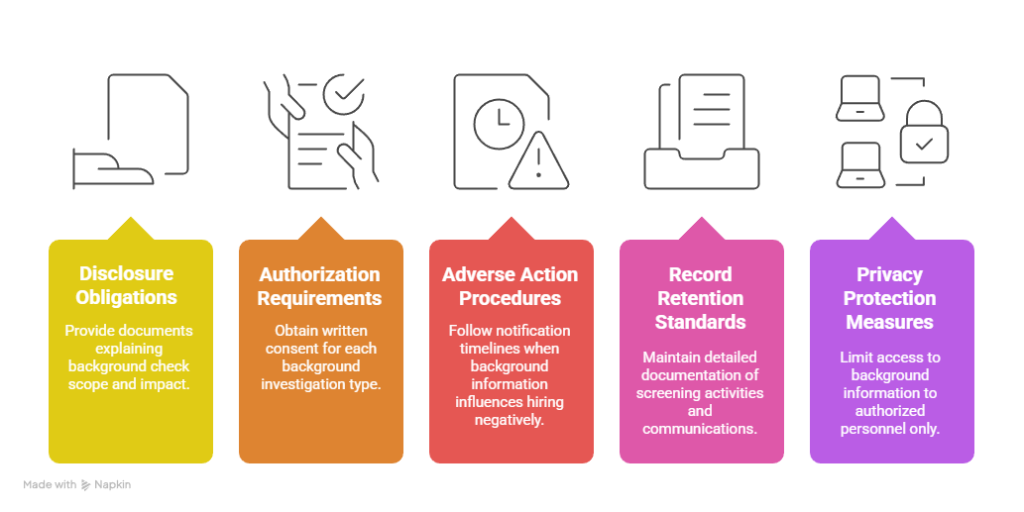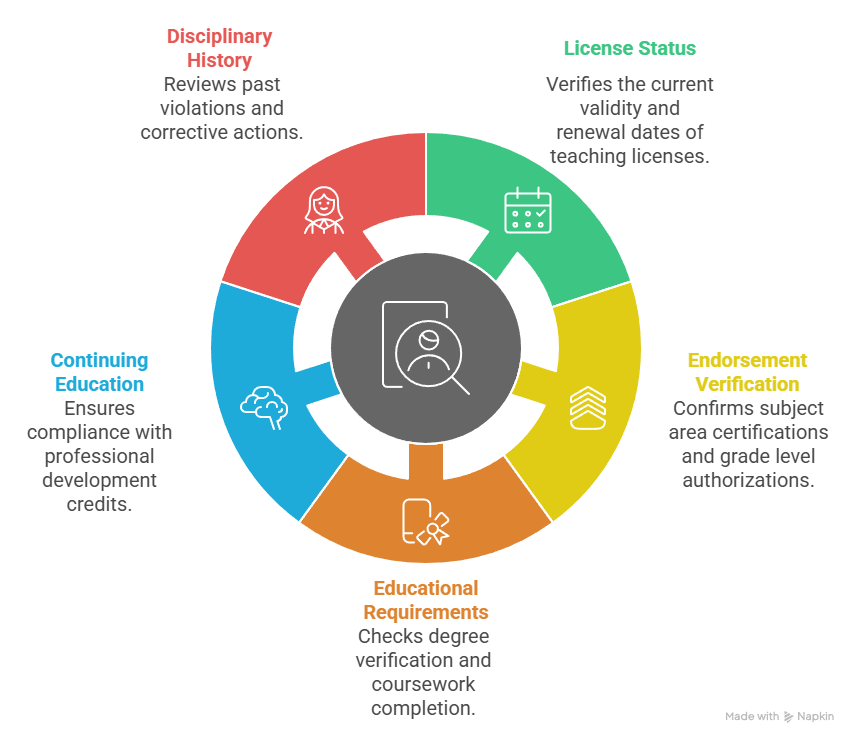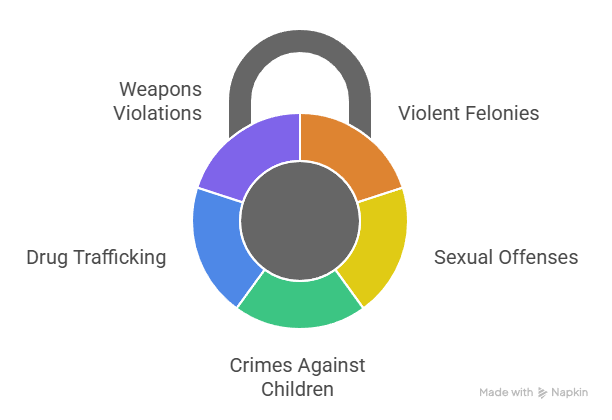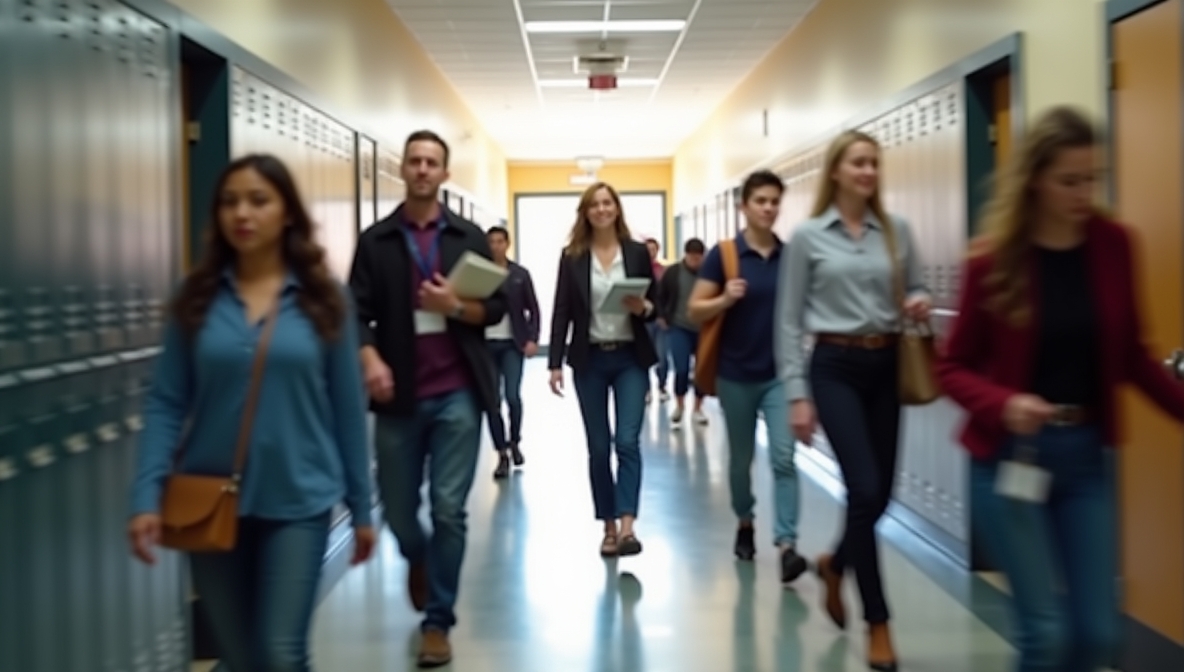Wisconsin education employee background checks are mandatory screening processes required by state law for all individuals working in educational settings, including teachers, administrators, support staff, and volunteers. These comprehensive checks protect students while ensuring qualified professionals enter the education workforce through verified criminal history reviews, reference checks, and credential verification.
Key Takeaways
- Wisconsin education employee background checks are legally required for all school personnel under Wisconsin Statutes Chapter 118, with specific requirements varying by position type and school district policies.
- The screening process includes criminal background checks, sex offender registry searches, professional reference verification, and educational credential authentication through the Wisconsin Department of Public Instruction.
- Processing times typically range from 5-15 business days for standard checks, though complex cases involving out-of-state records or credential verification may require additional time.
- Costs vary by screening level, ranging from $25-75 for basic checks to $150-300 for comprehensive educator screenings that include fingerprinting and federal database searches.
- Certain criminal convictions automatically disqualify candidates from education positions, while others may be evaluated on a case-by-case basis depending on the nature, timing, and relevance to educational responsibilities.
- Staffing agencies and employers must ensure FCRA compliance when conducting background checks, including proper disclosure, authorization, and adverse action procedures to protect candidate rights.
Understanding Wisconsin Teacher Background Check Requirements
Wisconsin state law mandates comprehensive background screening for education employees. This ensures safe learning environments across all educational institutions. The Wisconsin Department of Public Instruction oversees these requirements. Moreover, school districts must verify each employee's background before employment begins.
The screening process applies to various education professionals. Teachers, substitute teachers, and administrators must complete background checks. Additionally, counselors, support staff, and student teachers require verification. Contractors and volunteers working directly with students also need screening. Furthermore, these requirements extend beyond traditional classroom settings to include after-school programs and tutoring services.
State regulations require both state and federal criminal history searches. Enhanced screenings may include fingerprint-based FBI background checks. These comprehensive checks help districts identify potential risks. Consequently, Wisconsin education employee checks maintain compliance with state education standards. The process protects students while ensuring qualified professionals enter the workforce.
Types of Wisconsin School Background Check Process Components
Wisconsin education employee screening involves multiple verification types. Criminal history searches examine state and federal databases thoroughly. Sex offender registry checks protect students from potential predators. Professional reference verification confirms previous employment performance. Educational credential authentication ensures proper qualifications. Each component serves a specific protective purpose in the hiring process.
The Wisconsin school background check process begins with basic criminal searches. State databases provide initial screening results quickly. Federal searches offer comprehensive national coverage. Meanwhile, fingerprint-based checks ensure accurate identification. Enhanced verification may include multi-jurisdictional searches. These layered approaches create thorough protection for educational environments.
| Check Component | Primary Purpose | Coverage Area | Typical Timeline |
| Criminal History | Safety verification | State and federal | 5-10 business days |
| Sex Offender Registry | Student protection | National databases | 1-3 business days |
| Employment Verification | Performance confirmation | Previous employers | 7-14 business days |
| Credential Check | Qualification validation | Educational institutions | 5-10 business days |
Advanced screening packages combine all components for comprehensive evaluation. This integrated approach ensures no critical information is missed during the hiring process.
Criminal Background Investigation Standards
Wisconsin education employers must conduct thorough criminal background investigations. These searches examine court records, arrest histories, and conviction data. The process includes reviewing misdemeanor and felony charges carefully. Particular attention focuses on crimes involving violence, theft, or moral turpitude.
Fingerprint-based background checks provide the most comprehensive criminal history review. The FBI's Integrated Automated Fingerprint Identification System searches national databases. This method ensures accurate identification and reduces false matches. Additionally, it prevents missed records due to name variations or incomplete data.
Professional Reference and Credential Verification
Education-specific background checks require verification of previous employment in educational settings. Former supervisors, principals, and district administrators provide valuable insights. Reference checks reveal information not captured in criminal databases. They often uncover workplace behavior patterns and ethical concerns that impact student safety.
Employment verification confirms dates of service and position responsibilities. The process also identifies reasons for departure from previous education roles. This helps recognize patterns of problematic behavior or performance issues. Thorough reference checking reduces hiring risks significantly while ensuring candidate suitability for educational environments.
Education Employee Screening Wisconsin Compliance Requirements
Wisconsin follows strict compliance standards for education background screening. The Fair Credit Reporting Act governs all background check procedures. Employers must provide clear disclosure documents explaining the screening scope. Candidates must provide written authorization before any screening begins. Separate consent forms are required for each type of investigation conducted.
FCRA compliance includes proper adverse action procedures when background results influence hiring. Pre-adverse action notices must include a copy of the background report. Employers must also provide a summary of FCRA rights to candidates. Reasonable time must be allowed for candidates to dispute inaccurate information. Final adverse action notices require additional documentation and screening company contact information.
Key compliance requirements include:

- Disclosure obligations: Provide standalone documents explaining background check scope and potential employment impact before screening begins.
- Authorization requirements: Obtain written consent for each type of background investigation, with separate forms for criminal, employment, and education verification.
- Adverse action procedures: Follow proper notification timelines when background information influences hiring decisions negatively.
- Record retention standards: Maintain detailed documentation of all screening activities and candidate communications for compliance audits.
- Privacy protection measures: Limit access to background information to authorized personnel involved in hiring decisions only.
Wisconsin education employers working with staffing agencies must ensure all parties maintain compliance. This shared responsibility requires clear agreements outlining each party's obligations throughout the screening process.
State-Specific Legal Requirements
Wisconsin Statutes Chapter 118 outlines specific requirements for education employee screening. These laws mandate criminal background checks for all school personnel. The statutes also define disqualifying offenses and evaluation criteria. Additionally, they establish timelines for completing required screenings before employment.
State regulations require verification of teaching licenses and professional credentials. The Department of Public Instruction maintains comprehensive licensing records. These include disciplinary actions, license suspensions, and professional conduct violations. Regular updates ensure current compliance with all Wisconsin education requirements.
Wisconsin Teaching License and Credential Verification Process
Wisconsin requires all teachers to hold valid licenses issued by the Department of Public Instruction. License verification confirms current status and endorsement areas. The process also identifies any restrictions or conditions affecting teaching eligibility. The DPI maintains comprehensive records of disciplinary actions and professional conduct violations. Additionally, license checks ensure compliance with continuing education requirements.
Credential verification extends beyond basic license status to include educational requirements. Student teaching evaluations and practicum records provide additional verification. University transcripts confirm completion of required degree programs. This comprehensive review ensures teachers meet all state requirements for their assigned positions. Moreover, it verifies grade level endorsements and subject area certifications.
Verification components include:

- License status confirmation: Current validity, renewal dates, and any pending disciplinary actions or restrictions affecting teaching eligibility.
- Endorsement verification: Subject area certifications, grade level authorizations, and specialty program qualifications for assigned teaching positions.
- Educational requirements: Degree verification, student teaching completion, and required coursework for initial and continuing licensure.
- Continuing education compliance: Professional development credits, renewal requirements, and ongoing training obligations for license maintenance.
- Disciplinary history review: Past violations, corrective actions, and any ongoing monitoring or probationary status affecting employment eligibility.
The verification process ensures complete compliance with Wisconsin teaching standards. This protects districts from liability while maintaining educational quality standards.
Criminal History Evaluation and Disqualification Standards
Wisconsin law identifies specific criminal offenses that automatically disqualify individuals from education employment. Serious felonies including violent crimes result in permanent employment bars. Sexual offenses and crimes against children also trigger automatic disqualification. Drug trafficking and weapons offenses on school property create additional barriers. These comprehensive restrictions protect students while providing clear guidance for employers and candidates.
The state maintains detailed lists of disqualifying offenses with specific statutory references. Recent updates in 2025 expanded automatic disqualification criteria significantly. New additions include cyberstalking and online exploitation of minors. Certain domestic violence convictions now also result in employment bars. These updates reflect evolving threats and enhanced student protection measures.
Non-disqualifying criminal history receives individual evaluation based on multiple factors. The offense nature, timing, and rehabilitation evidence influence decisions. Wisconsin follows a structured analysis considering job relatedness and conviction age. Candidates must demonstrate rehabilitation through community service, education, or professional development. This balanced approach protects students while allowing qualified candidates with minor infractions to pursue education careers.
Automatic disqualification offenses include:

- Violent felonies: Murder, assault with intent to cause bodily harm, armed robbery, and aggravated battery convictions permanently bar education employment regardless of timing.
- Sexual offenses: Any conviction requiring sex offender registration, including statutory rape, sexual assault, and possession of child pornography materials.
- Crimes against children: Child abuse, neglect, endangerment, or exploitation offenses result in permanent disqualification regardless of conviction date or sentence completion.
- Drug trafficking: Manufacturing, distributing, or trafficking controlled substances, particularly near schools or involving minors in criminal activities.
- Weapons violations: Carrying weapons on school property, weapons trafficking, or using firearms in the commission of other criminal offenses.
Evaluation criteria for non-disqualifying offenses consider the specific duties of the intended position. This ensures appropriate matching between candidate backgrounds and job responsibilities while maintaining student safety priorities.
Case-by-Case Evaluation Process
Wisconsin employs structured evaluation criteria for non-disqualifying criminal history. The process examines offense severity, sentence completion, and post-conviction conduct. Administrative roles may have different standards than direct classroom instruction positions. Time elapsed since conviction plays a significant role in evaluation decisions.
Rehabilitation evidence includes community service, educational achievements, and professional development activities. Employment history and personal references provide additional context for evaluation. Character witnesses and community involvement demonstrate positive behavioral changes. This comprehensive review ensures fair consideration while maintaining safety standards for educational environments.
Background Check Processing Timeline and Associated Costs
Wisconsin education employee background checks require varying processing times depending on scope and complexity. Basic state criminal checks typically complete within 3-5 business days. However, comprehensive screenings including federal databases may require 10-20 business days. Rush processing options are available for urgent hiring situations. Nevertheless, expedited services often incur additional fees that increase overall costs.
Factors affecting processing time include candidate cooperation and information accuracy. Out-of-state records and sealed court files may extend processing significantly. International background elements create additional delays in verification. Complex employment histories require more time for thorough reference checking. Staffing agencies and employers should plan screening timelines accordingly to meet hiring deadlines effectively.
Processing timeline factors:
- Information accuracy: Complete and accurate candidate information speeds processing, while errors or omissions cause delays requiring additional verification steps.
- Geographic scope: Local searches process faster than multi-state or international background investigations requiring coordination across jurisdictions.
- Record accessibility: Public records process quickly, while sealed or restricted files require additional time and legal procedures for access.
- Reference availability: Readily available professional references expedite verification, while difficult-to-reach contacts extend processing timelines significantly.
Cost considerations vary based on screening package comprehensiveness and additional services required. Districts often negotiate volume pricing for multiple screenings throughout the year. Individual candidates may pay higher rates for single checks when required. Some employers cover screening costs as part of their hiring investment strategy.
Rights and Best Practices for All Stakeholders
Job seekers have specific rights during the Wisconsin education employee background check process. Candidates must receive clear disclosure about screening activities and potential impact on employment. They have rights to receive copies of background reports used in hiring decisions. The dispute process allows candidates to correct errors and provide additional context. Wisconsin privacy laws and education employment statutes provide additional protections for job seekers.
Effective screening requires systematic processes that balance thoroughness with efficiency. Employers should establish clear policies outlining requirements for different position types. Consistent application ensures legal compliance while maintaining fairness across hiring decisions. Regular policy updates reflect changing legal requirements and industry best practices. Investment in technology and automation improves efficiency while maintaining accuracy and compliance standards.
Best practice implementation strategies:
- Policy development: Create comprehensive background check policies defining requirements, timelines, and evaluation criteria for different education positions clearly.
- Vendor management: Establish relationships with FCRA-compliant screening providers who understand education industry requirements and Wisconsin-specific regulations thoroughly.
- Staff training: Educate hiring managers and HR personnel on proper procedures, legal requirements, and appropriate use of background information.
- Documentation systems: Maintain detailed records of all screening activities, candidate communications, and decision-making rationales for compliance audits.
- Quality assurance: Implement regular audits of background check processes to identify improvement areas and ensure continued legal compliance.
Staffing agencies specializing in education placements must maintain expertise in Wisconsin-specific requirements. Standardized screening packages ensure consistency while allowing customization for district needs. Strong vendor relationships facilitate efficient processing and reliable results delivery.
Conclusion
Wisconsin education employee checks serve as essential safeguards protecting students while ensuring qualified professionals enter the education workforce. These comprehensive screening processes require careful attention to legal compliance, thorough investigation procedures, and fair evaluation of results. Understanding state requirements, FCRA obligations, and best practices helps all stakeholders navigate the screening process effectively while maintaining the highest standards for educational environments. As regulations continue evolving in 2025, staying current with legal requirements and industry standards remains crucial for successful hiring outcomes.
Frequently Asked Questions
How long do Wisconsin education employee background checks take to complete?
Standard Wisconsin education background checks typically take 5-15 business days, depending on the scope of screening required. Basic state criminal checks may complete in 3-5 days, while comprehensive screenings including FBI fingerprint checks, out-of-state records, and detailed employment verification can require 15-20 business days.
What disqualifies someone from working in Wisconsin schools?
Automatic disqualification occurs for serious felonies including violent crimes, sexual offenses, crimes against children, drug trafficking, and weapons violations on school property. Other criminal history is evaluated case-by-case based on job relatedness, timing, and evidence of rehabilitation.
Who pays for Wisconsin education employee background checks?
Payment responsibility varies by employer policy and position type. Some school districts cover background check costs as part of their hiring investment, while others require candidates to pay fees ranging from $45-400 depending on the screening level required.
Are volunteers required to complete background checks in Wisconsin schools?
Yes, Wisconsin requires background checks for volunteers who have direct, unsupervised contact with students. The scope of screening may be less comprehensive than employee checks, but criminal history and sex offender registry searches are typically required.
Can someone with a criminal record teach in Wisconsin schools?
It depends on the specific offense and circumstances. While certain serious crimes result in automatic disqualification, other criminal history is evaluated individually based on factors including offense nature, timing, job relevance, and evidence of rehabilitation.
How often must Wisconsin education employees renew their background checks?
Wisconsin does not require routine renewal of background checks for continuing employees. However, districts may require new screening when employees change positions, face criminal charges, or as part of periodic policy reviews. Most background checks remain valid throughout continuous employment.
Additional Resources
- Wisconsin Department of Public Instruction Background Check Requirements
https://dpi.wi.gov/licensing/background-checks - Fair Credit Reporting Act Compliance Guide for Employers
https://www.ftc.gov/business-guidance/resources/using-consumer-reports-what-employers-need-know - National Association of State Directors of Teacher Education and Certification
https://www.nasdtec.net/ - Wisconsin Statutes Chapter 118: General School Operations
https://docs.legis.wisconsin.gov/statutes/statutes/118 - Equal Employment Opportunity Commission Background Check Guidance
https://www.eeoc.gov/laws/guidance/enforcement-guidance-consideration-arrest-and-conviction-records-employment - Wisconsin Department of Justice Criminal History Record Searches
https://www.doj.state.wi.us/dles/cib/criminal-history-record-searches
Still have questions?
Get in touch with our team today for a personalized demo and discover how our tailored volume pricing and packages can drive results for your business!
How useful was this page?*
Note: your comments are anonymous. We use them to improve the website. Do not include any personal details.
Visit our FCRA Compliance Tool or leave a message here if you need a response.
From the blog Explore the GCheck Content Hub

How Long Does a Background Check Take? A Complete 2025 Guide
13 Dec, 2023 • 14 min read
The Ultimate Background Check Guide
13 Dec, 2023 • 4 min read
The Ultimate Guide to Employment Background Checks
13 Dec, 2023 • 10 min readThe information provided in this article is for general informational and educational purposes only and should not be construed as legal advice or a substitute for consultation with qualified legal counsel. While we strive to ensure accuracy, employment screening laws and regulations—including but not limited to the Fair Credit Reporting Act (FCRA), Equal Employment Opportunity Commission (EEOC) guidelines, state and local ban-the-box laws, industry-specific requirements, and other applicable federal, state, and local statutes—are subject to frequent changes, varying interpretations, and jurisdiction-specific applications that may affect their implementation in your organization. Employers and screening decision-makers are solely responsible for ensuring their background check policies, procedures, and practices comply with all applicable laws and regulations relevant to their specific industry, location, and circumstances. We strongly recommend consulting with qualified employment law attorneys and compliance professionals before making hiring, tenant screening, or other decisions based on background check information.

